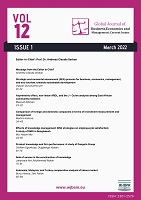Effects of knowledge management (KM) strategies on employee job satisfaction: A study of RMG in Bangladesh
Effects of knowledge management (KM) strategies on employee job satisfaction: A study of RMG in Bangladesh
Author(s): Hasan MiaSubject(s): Epistemology, Labor relations, Globalization
Published by: Birlesik Dunya Yenilik Arastirma ve Yayincilik Merkezi
Keywords: Codified knowledge; job satisfaction; Knowledge management; Tacit or personalized knowledge;
Summary/Abstract: Knowledge Management strategy is a way of acquiring, creating, transferring, utilizing, and retaining knowledge. This paper aims to review and analyze literature related to knowledge management strategies and their effects on employee job satisfaction. It focuses on how employees react regarding their job satisfaction when they use knowledge management strategies. In the literature review, knowledge, knowledge management, knowledge management strategies, Codified and tacit knowledge, and employee job satisfaction are described and cited from different articles and journals. Data are collected from the survey and some top RMG industries to understand the job satisfaction of employees towards two knowledge management strategies. Respondents are selected according to their age, experience, and departments. Different factors like compensation structure, user friendly, relation with co-workers, autonomy, and the workload of job satisfaction are identified with the help of different literature and analyzed with knowledge management strategies through factor analysis. This paper also indicates that employees are more comfortable with tacit strategy than codified strategy. This paper ends with a conclusion and proper referencing.
Journal: Global Journal of Business, Economics and Management: Current Issues
- Issue Year: 12/2022
- Issue No: 1
- Page Range: 44-60
- Page Count: 17
- Language: English

